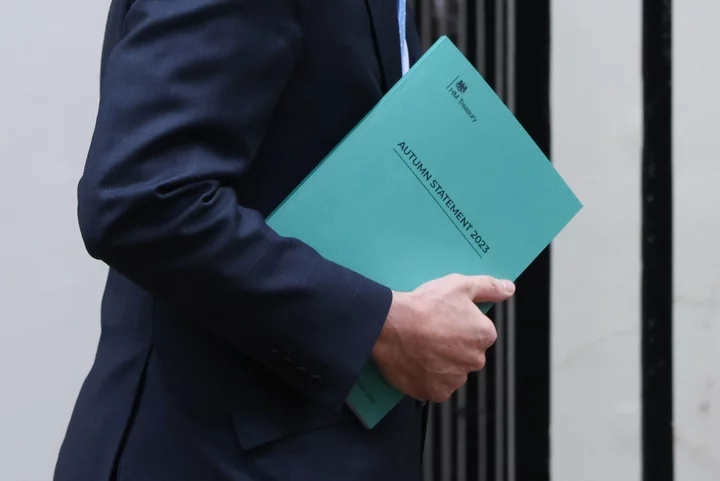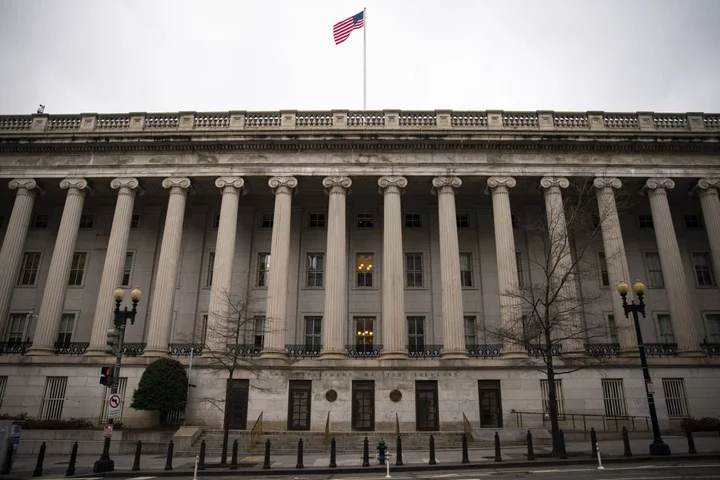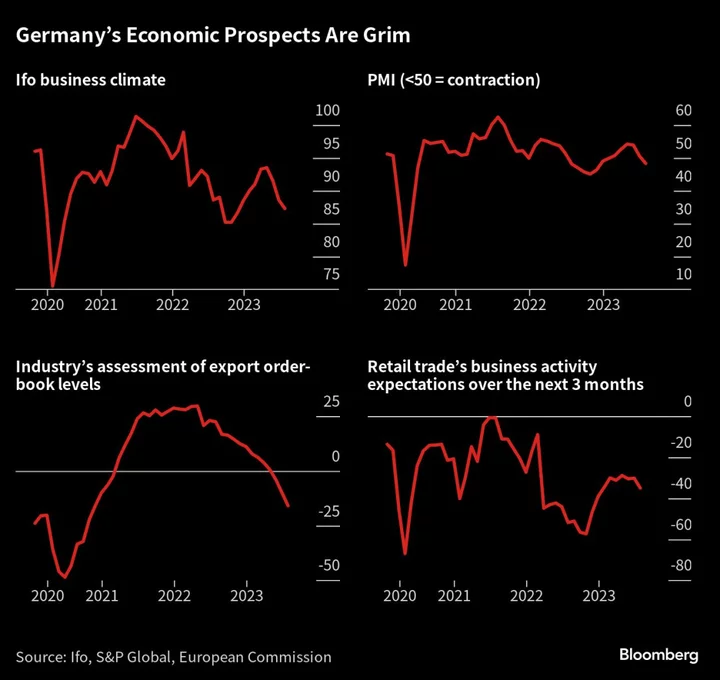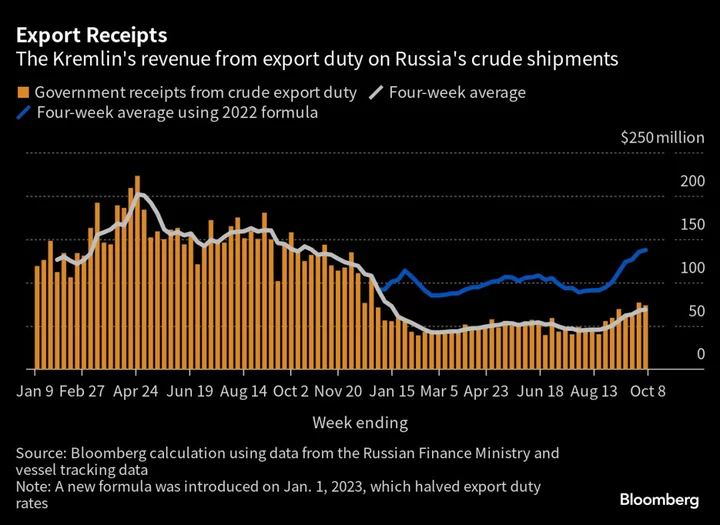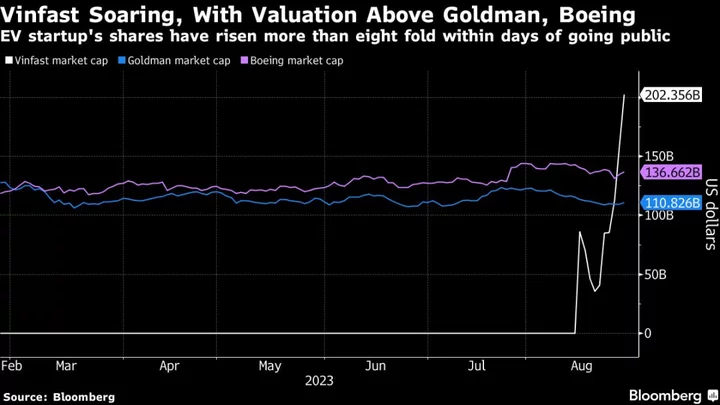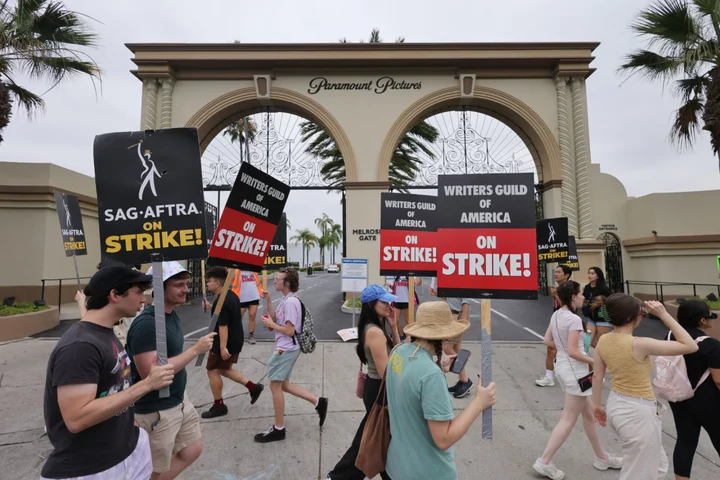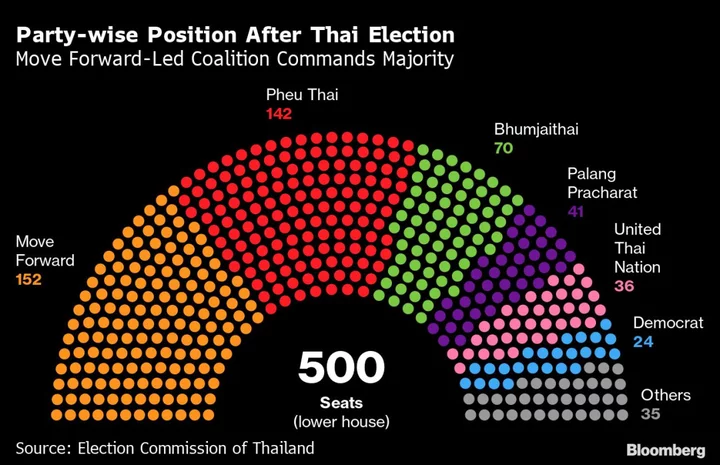In a live Q&A on the Markets Today blog, we asked experts from across the newsroom for their analysis of Jeremy Hunt’s Autumn Statement.
Here is a lightly edited transcript of the conversation. For the latest on everything that matters for UK investors, check out Markets Today.
How has Jeremy Hunt found the money to make the moves on tax cuts?
Bloomberg senior UK economy reporter Phil Aldrick said:
“Hunt has given away £21 billion in the biggest package of tax cuts since 1988. The windfall was down to a combination of high inflation and government limits on tax thresholds and public spending.
Typically, income tax thresholds rise in line with price so workers pay no more tax if their wages rise in line with inflation. Similarly, public spending typically rises in line GDP.
The government has frozen income tax thresholds to 2028 and imposed tight limits on public spending. As a result, it will collect £45 billion extra tax from “fiscal drag” on wages in the 2028-29 financial year — more than double the £21 billion it is giving back in cuts to business taxes and National Insurance.
The tax burden hits a post-World War II high of 37.7% which compares with around 33% before the pandemic. Had he not cut taxes it would have been even higher at 38.7%.
Had tough spending limits not been imposed, Hunt would have had to spend his windfall on public services like health and prisons. He was only able to give it back in tax cuts by effectively taking £19 billion from public services, the Office for Budget Responsibility said.”
Why was Hunt able to cut taxes without sparking market chaos but Truss wasn’t?
Bloomberg bonds and FX Reporter Greg Ritchie said:
“Hunt’s plans were a lot less radical. Despite saying the measures amounted to “the biggest package of tax cuts to be implemented since the 1980s,” the tax burden remained at a post-World War II high of 37.7% of GDP. That’s because of things he didn’t change.
For example, tax income thresholds are frozen, even as wages and inflation rise. Investors are also reassured by Hunt using the Office for Budget Responsibility to guide his policies, unless Kwarteng’s mini-budget last year.”
What does this all mean for me?
John Stepek, Bloomberg Wealth reporter and the author of the Money Distilled newsletter said:
“The two percentage point cut in the basic rate of National Insurance from 12% to 10% means employees will be paying a bit less income tax from January.
Yes, it’s true that this is, in effect, just a partial reversal of a much bigger tax hike made previously via fiscal drag (the freezing of income tax thresholds so that you end up paying more tax due to inflation, rather than actually earning more in “real” terms) but it’s still better than nothing. The scrapping of compulsory Class 2 NICS for the self-employed, and the reduction in the Class 4 rate also kicks in from April.
As for other taxes - inheritance tax was notable by its absence, despite a lot of speculation before the statement. My suspicion is that any announcements on that front will be held back until the last pre-election minute, maybe for the Spring Statement. Also, just a reminder (one curiously absent from the chancellor’s speech, I can’t think why) that from April 6 2024, the capital gains tax allowance halves again, to just £3,000. At the start of 2023, it was still £12,300. And the dividend tax allowance falls to £500 (it was £2,000 at the start of this year).”
What else was there for the average Brit in the statement?
UK business editor Julian Harris said:
“Chancellors love nothing more than a cheery announcement about the price of a pint. It’s the easiest PR trick in the book, a cheap measure that wins disproportionate praise. Hunt grinned as he name-checked a local pub in his constituency while declaring a freeze on alcohol duty.
Shares in pub groups edged higher, while bosses said it would help them avoid passing price rises on to punters. With hundreds of pubs closing due to cost pressures, train strikes and more people drinking at home, it was a much-needed boost for the sector.”
Is this enough for Tory MPs?
Ellen Milligan, UK government reporter said:
“Both Tory MPs and strategists will be happy with most of the front pages of the British papers today, who have relatively positive write-ups, going big on the tax cut and burying the news of the rising tax burden and downgraded growth forecasts.
Some MPs wanted Hunt to go further, but the Chancellor has very much set expectations high for the Spring budget — with government sources pointing to possible cuts in income and inheritance tax.
Will this budget help the economy?
Lizzy Burden, UK correspondent for Bloomberg TV said:
“In the OBR’s updated forecasts, the growth rate was revised down meaning the UK might avoid recession next year but it will still flirt with it — so all those measures to boost growth were necessary, even if they only end up adding 0.3%. Meanwhile, the fiscal watchdog said the Bank of England would reach its 2% inflation target a year later than expected.
The big irony is that, while Rishi Sunak said on Monday that tax cuts were possible because inflation had halved, in fact they were funded largely because high inflation boosted tax receipts. It reminded me of when the Prime Minister said at Conservative Party Conference that his was the party of change — after 13 years in power. Bit of a clanger.
Cebr CEO Nina Skero put it bluntly on Bloomberg TV this morning, telling me “it seems like the chancellor has taken away with both hands and now he’s giving back with one”
So, are the announcements Hunt made going to fuel inflation?
UK economy reporter Tom Rees said:
“Economists believe this package could have a small impact on inflation. The cut to national insurance will put more money in people’s pockets from January when inflation is still expected to be double the BOE’s 2% target.
However, parts of Hunt’s package — the business tax breaks and reforms to increase worker participation — are aimed at boosting the supply side of the economy, helping to offset some of the inflationary impact of other tax cuts.”
How did the market take the news?
Greg Ritchie said:
“The pound and gilts were unperturbed throughout Hunt’s speech.
It was only when he sat down and the UK’s Debt Management Office released its revised gilt sales plan that things really started moving. Bond yields rose as sales were higher-than-forecast by analysts.
Still, the move was relatively small and orderly, especially compared to last year’s market chaos.”
Did Hunt do anything for the housing market?
John Stepek said:
“Yes - he left it alone. OK I’m being a little facetious, but the fact that he resisted the pointless gimmick of pulling another stamp duty holiday out of the hat was a net positive as far as I’m concerned (though whether he can resist that before the election comes round is yet to be seen). He didn’t leave it entirely alone - the mortgage guarantee scheme (designed to encourage lenders to offer more 95% mortgages) was extended until the end of 2024, but given the competitiveness of the UK mortgage market, it’s not really necessary anymore - as Kellie Steed of comparison site Uswitch pointed out, “the vast majority of mortgage providers have now returned to 95% LTV lending without the scheme’s backing.”
Other housing-related elements included unfreezing the Local Housing Allowance (the amount that people on benefits can claim to help with rent from private landlords), plus various reforms to try to speed up planning decisions for housebuilding and tackle the thorny topic of nutrient neutrality.”
Are we really going back to austerity?
Phil Aldrick said:
“Austerity is generally defined as a squeeze on public services and associated most recently with George Osborne in the early 2010s. On that definition, the UK will return to austerity if the government spending plans set out in the Autumn Statement can be believed.
Overall departmental spending in real terms per person falls slightly between 2022 and 2027 – but for unprotected departments like the Home Office and Justice the cuts are almost as deep as the early Osborne years. The difference is the starting point. Public services were well-funded when Osborne began his austerity program but are struggling today, which will make any cuts far harder to deliver. Resolution called the plans “far-fetched.”
Whether the spending plans will be delivered depends on who wins the election. Osborne pledged even deeper cuts after 2015 but those were unwound by 2018. It is likely a new government will change the plans.”
What’s the takeaway for British businesses and what else would they like to have seen?
Julian Harris said:
“Businesses have been clamouring for a stable tax regime, and one that encourages them to lift Britain’s tepid level of investment. They finally have it after Hunt announced that companies will be able to use the full cost of capital spending to reduce their tax bills. This had already been a temporary policy but is now permanent and Labour’s Rachel Reeves backed the idea, so businesses know a new government won’t change course, allowing them to plan ahead with certainty.
There was more tinkering elsewhere, however. Business rates — a divisive property tax — will be kept low for many small companies, but large ones face an increase, provoking anger from major retailers who also face a jump in salary costs after the minimum wage was hiked by nearly 10%. There was also some frustration that the cut to employees’ National Insurance was not matched by a reduction in NI paid by employers, which has long been described as a tax on jobs.”
What’s happening with NatWest?
Finance editor Marion Dakers said:
“Hunt said the government would explore a possible sale of NatWest shares to the general public, a new front in the UK’s longstanding push to sell down its remaining £7 billion stake in the lender.
While details were skimpy, its likely these shares would be offered at a discount to the share price. But whether the public will be drawn in similar numbers to the 1986 flotation of British Gas that Hunt referenced is hard to say. Bank valuations remain in the doldrums and NatWest has found itself mired in a recent debanking scandal.”
There were a series of announcements on ISAs and pension funds. Let’s start with ISAs, and how big a deal the changes Hunt announced are?
Investing team leader Shelley Robinson and asset management reporter Loukia Gyftopoulou teamed up to tackle the question, and said:
“Hunt froze the thresholds on adult and junior ISAs but removed some restrictions on payments into cash and stocks & shares ISAs. Now adults can spread their £20,000 annual ISA allowance over multiple cash and S&S ISAs, giving them access to multiple ISA providers. He also said savers will be able to start investing into certain ‘fractional shares’ within S&S ISAs in future, removing the current obligation to hold at least one share in full which is expensive for some companies. This policy lacked detail, though.
There was notably no mention of changes to Lifetime ISA rules, which first-time buyers can use for their first home deposit. Hunt didn’t raise the thresholds on eligible property and given the rise in property prices, even after some recent declines, many are priced out of the benefits.
The government will allow a new type of semi-liquid vehicle into ISAs, which gives investors exposure to private assets, as well as open-ended property funds where redemptions can only happen at certain intervals. The Treasury said it plans to digitise the reporting systems supporting ISAs to enable easier transfers between ISA accounts, a process that’s currently time consuming.”
How impactful could the measures on pensions be?
Shelley Robinson and Loukia Gyftopoulou add:
“The measures can be seen as part of a plan to consolidate the pensions industry.
Hunt announced a consultation on giving people the option of one ‘pension pot for life’ to reduce the number of pots building up. Under the proposed model, savers would be given the option to ask a new employer to pay pension contributions into their existing pot, a similar approach to the system in Australia. The worry is that this pushes decision-making onto savers, who will need better financial education and support before making these decisions and it also increases the administrative burden on employers.
The government is also going ahead with plans to introduce a multiple default consolidator model for defined benefit schemes to deal with the small pots issue. This would allow a few authorised schemes to act as a consolidator for eligible pots under £1,000. Hunt said that by 2030, the majority of savers with DC pensions would be managed in schemes of over £30 billion.”
What does this tell us about the prospects for an early election?
Ellen Milligan says:
“The one big giveaway that Sunak is considering calling an earlier-than-expected election next year was Hunt announcing legislation to push through the cut in National Insurance in January rather than waiting until April. If there is a May election, it means people will already be feeling the impact of that reduction and it gives Hunt more room in a Spring budget to hand out further tax giveaways. Sunak may still opt for an Autumn election, but the fact that an earlier vote is being considered is why I’m told the Labour Party is preparing for the first week of May.
Hunt fuelled that speculation this morning by not ruling out holding the Spring budget — which is usually held in March — in February instead, telling LBC that he “hasn’t taken any decisions as to the exact date.” An election has to be called at least 25 days before the vote is held, so Sunak will have to fire the starting gun for a May election in late March or early April.”
Finally, how will the announcements impact the Bank of England’s thinking?
Tom Rees said:
“It’s unlikely to transform the picture for the BOE and inflation, though supporting household finances at a time of high inflation — relative to before the Autumn Statement — is not helpful for the rate-setters.
It could be a small factor feeding into the case being made by rate-setters to keep interest rates in restrictive territory for a prolonged period.”
Author: David Goodman, Sam Unsted and Charlotte Hughes-Morgan

